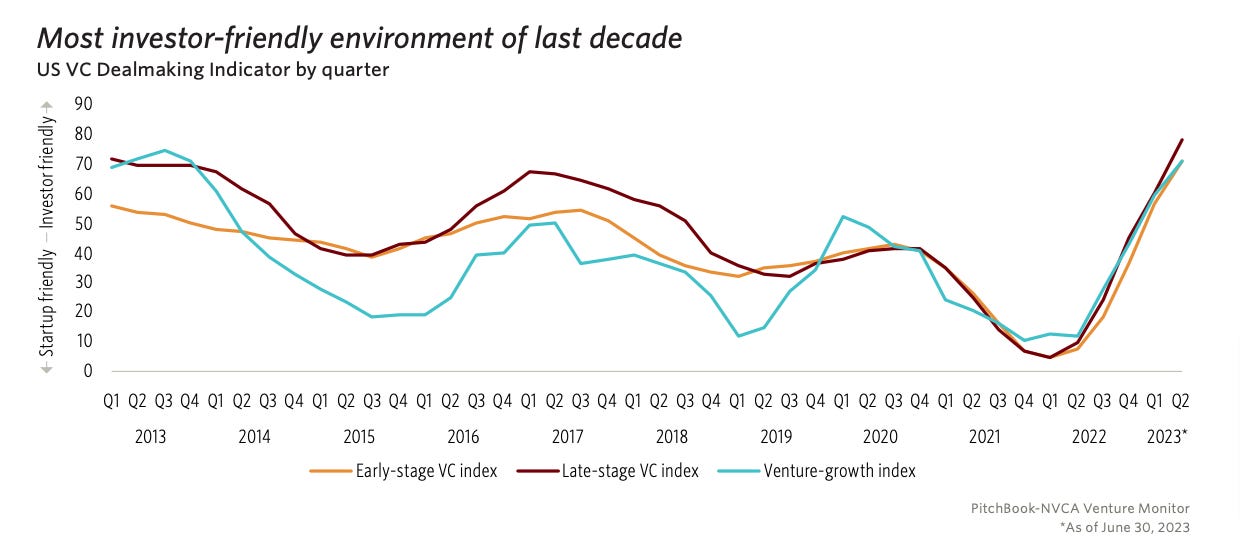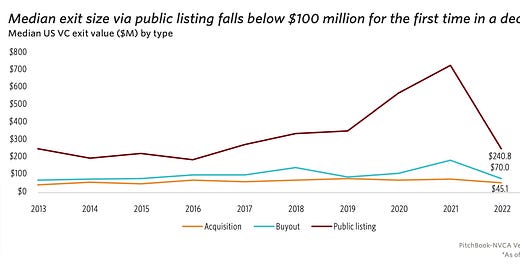A Bleak VC Outlook, Andreessen Roots for a Fight, A Ripple Win & Liquid Death IPO Talks
The slowdown in public offerings and late-stage financings puts startups in peril
The generative artificial intelligence mania has been a nice narrative respite from the overall downturn in startups and venture capital. Paired with a rebound in big public technology stocks and overall promising economic performance, the startup panic has been more muted than it would be in an alternative universe where struggling startups were getting all the attention.
But a fresh report from PitchBook, data from Crunchbase, and other recent writings show that the startup funding situation remains bleak. There are fundamental problems with the business of startups as interest rates continue to rise. The Federal Funds Rate today sits at 5.08% after years of near-zero interest rates.
The public markets are looking for profits sooner than many startups can deliver. That forward-looking speculation that startups so adeptly delivered for years is no longer the market mandate. That’s sending ripples throughout the entire venture capital ecosystem, posing fundamental questions about how many venture capital funds the world really needs.

There are a number of big challenges facing the startup and venture capital ecosystem.
Few startups are going public and when they do they’re at smaller valuations. The median tech IPO has fallen to $69.5 million this year. The IPO slowdown has cut off the most important source of exits for startups. And remember that we had a backlog of IPO candidates. There are more than 1,000 unicorns. Investors had hoped that many would go public one day. Stripe, Instacart, Reddit, and many more remain private.
Valuations are down and deal volume is down.
Late-stage funding rounds are rare and when they’re happening (outside of generative AI) they’re often shoring up troubled late-stage startups.
New venture capital firms are going to have trouble raising more money.
Private equity firms and crossover firms seem to be flaking on growth stage rounds.
The ultimate problem here is that many startups are just not as valuable as investors once thought they were.
Footwork co-founder Nikhil Basu Trivedi explained the “culling of the unicorn herd” in a post this week:
Many of the companies that achieved Unicorn status in the private markets do not have businesses that merit their $1+ billion valuation. There will be a culling of the Unicorn herd, with some of these companies shutting down, others raising capital or exiting at valuations below $1 billion, still others who survive on their cash but don’t build businesses that merit future venture funding, and, hopefully, quite a few making it to the promised land of a multi-billion-dollar exit one day.
What we’ll realize is that the Unicorn term, while helpful in thinking about the companies that define “success,” was not the right goal for companies to seek. Venture funding and company building should never have been about achieving a $1 billion valuation in the private markets. We will realize the massive difference between being valued and actually exiting at an enterprise value north of $1 billion.

PitchBook gives a positive-sounding name to a dreary situation: We’ve entered the most “investor-friendly” startup environment in the past decade, according to a PitchBook report released this week.





